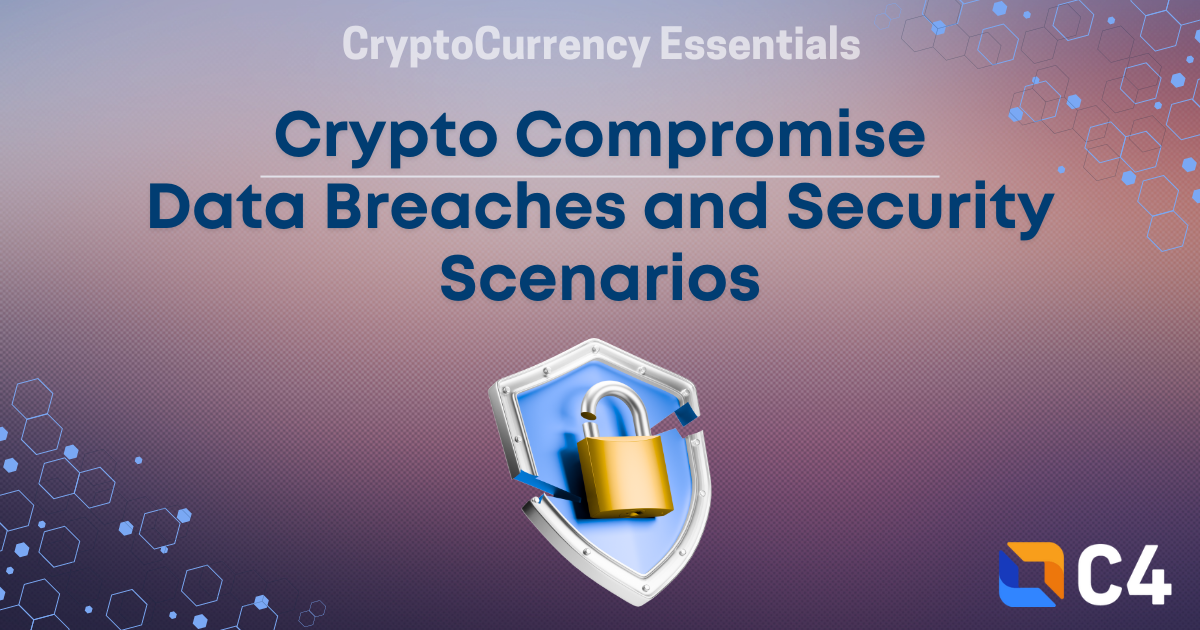
Crypto Compromise – Data Breaches and Security Scenarios
Overview
Unfortunately, data breaches happen. Any company, service, or piece of software may experience compromise at some point. Engineering secure software is a difficult challenge despite the best efforts of developers, and hackers continue to evolve their tactics. But what happens when there is a data breach, and what are some ways that an attacker can use stolen data to steal valuable information or even money? In this article, we’ll discuss two examples of data breaches that affect the cryptocurrency world in particular. We will discuss what kind of data can be stolen, how the compromise can affect users, and what individuals can do to mitigate those effects on their security and privacy.
Password Manager Breaches and Crypto Theft
The first breach in our list is that of LastPass, a cloud password manager. LastPass (and other password managers) allow users to securely store, generate, and autofill passwords and other secrets for various services. The user specifies a master passphrase that only they know, which is used as a key to encrypt the password vault using strong encryption. In order to access the secrets inside, a user must specify that master passphrase to decrypt the data inside.
This allows users to store lots of long, strong, randomly generated passphrases that a user could not remember on their own. A password manager is an excellent security tool for this reason, as it prevents password reuse and allows the use of stronger passphrases. However, the security of the master passphrase is critically important. If the vault uses strong, properly implemented encryption such as AES, the only way for an attacker to gain access to the data inside is to guess the password.
In August of 2022, LastPass experienced a breach where the encrypted vaults were stolen from LastPass. LastPass and other password manager companies don’t know or store your master passphrase, just the encrypted vaults. The attackers now have snapshots of those vaults from the time of compromise. But what does that mean for users? In order to gain access to the secrets stored inside, the attackers must try to crack the password using something like a brute- force or dictionary attack. This does take a lot of computing resources, but in some cases is quite worth the reward.
Unfortunately, some users did not use the best master passphrases possible. Those compromised vaults, in some cases, contained a juicy reward for the attackers – cryptocurrency seed phrases! Some users of LastPass that stored seed phrases in their vaults have had their cryptocurrency stolen as a result, as anyone that has the seed has access to the coins. A BIP39 passphrase, preferably not stored online or not stored with the seed, could have added an additional layer of protection.
It is absolutely critical that users of any password manager generate a very long, strong, high entropy passphrase to protect their vault. The master passphrase, in this case, is the weakest link in the chain. Compromise the passphrase, compromise the vault and all the secrets inside. It’s also important if you’re the victim of such a breach to be proactive. Move your secrets to a new platform, rotate the secrets (seed phrases, passwords, etc.) to new ones, and choose a new master passphrase. Active management of your data can mitigate the effects of such a compromise.
Crypto Company Email Leaks
Another, perhaps more straightforward data breach to understand occurred with CoinMarketCap, a cryptocurrency market information platform. The emails of over 3 million users were exposed – no passwords, just emails. It might seem that this is a relatively tame breach, as the attackers cannot directly crack and takeover accounts without a password breach.
However, emails allow a common vector of attack to flourish – phishing. One of the most effective ways for an attacker to compromise a user account isn’t technical, it’s human. Phishing is the act of tricking a user into giving up information that they shouldn’t such as a password or a crypto seed phrase. If your email is included in a data breach such as CoinMarketCap’s, it tells hackers something about you – that you use or are interested in cryptocurrency.
As such, attackers have used emails in this breach to send out all sorts of crypto-related phishing emails – pretending to be CoinMarketCap, Coinbase, Gemini, Metamask, and other crypto services, coins, airdrops, and more. Victims of this breach have been targeted with these wide-ranging phishing emails in the hope that users inadvertently give up a seed phrase, a password, or sign a malicious contract. In this case, it’s critical that users have awareness about phishing. Users should know what to look for when it comes to phishing – a sense of urgency, a too good to be true offer, coming from a different email than expected, and more. Again, active awareness and self-education is a key to preventing compromise.
Awareness and Activity
Breaches happen in the digital world, and crypto-related breaches can be particularly devastating as they have financial consequences. Two examples include the breach of password managers containing seed phrases or exchange credentials, and email breaches that make users the target of sophisticated phishing attacks. In both cases, active awareness is important for user security. Taking the time to educate oneself about phishing may prevent falling victim to theft. If a user knows they’ve been compromised in a password manager breach, taking the time to rotate credentials and choose a new master passphrase on an immediate basis, can help avoid loss.
This article was written by our CryptoCurrency Essentials (CCE) Committee, with special thanks to committee member Josh McIntyre.
Disclaimer
The information presented in this article is for educational and informational purposes only. It does not constitute financial advice, investment recommendations, or any form of endorsement.
The views and opinions expressed by individuals in this article are solely those of the speakers and do not necessarily represent those of C4 or any other organizations with which they are affiliated.
The mention or inclusion of any individuals, companies, or specific cryptocurrency projects in this video should not be considered as an endorsement or promotion.
Regulations and legal frameworks around cryptocurrencies may vary in different jurisdictions. It is your responsibility to comply with the applicable laws and regulations of your country or region.
